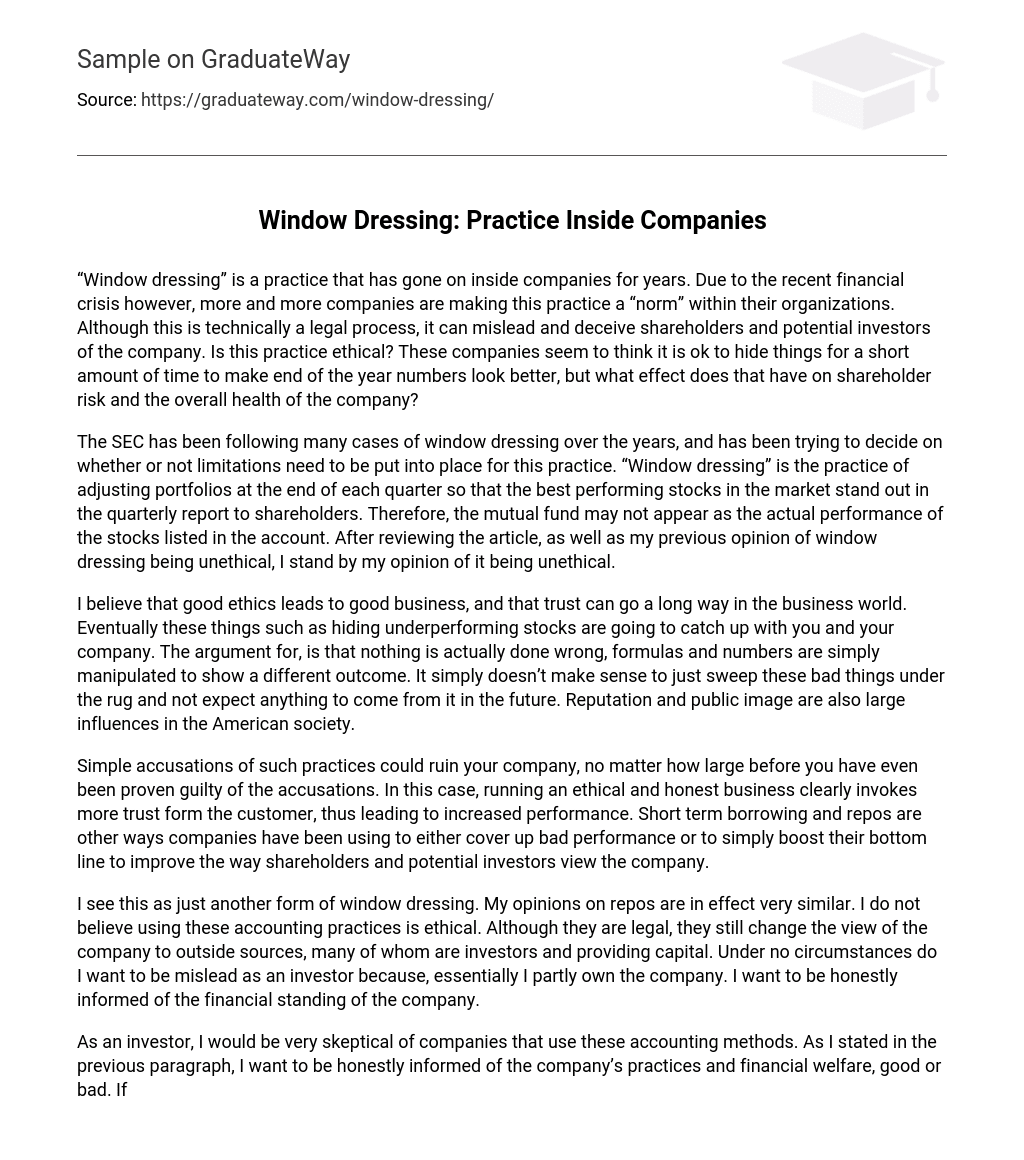“Window dressing” is a practice that has gone on inside companies for years. Due to the recent financial crisis however, more and more companies are making this practice a “norm” within their organizations. Although this is technically a legal process, it can mislead and deceive shareholders and potential investors of the company. Is this practice ethical? These companies seem to think it is ok to hide things for a short amount of time to make end of the year numbers look better, but what effect does that have on shareholder risk and the overall health of the company?
The SEC has been following many cases of window dressing over the years, and has been trying to decide on whether or not limitations need to be put into place for this practice. “Window dressing” is the practice of adjusting portfolios at the end of each quarter so that the best performing stocks in the market stand out in the quarterly report to shareholders. Therefore, the mutual fund may not appear as the actual performance of the stocks listed in the account. After reviewing the article, as well as my previous opinion of window dressing being unethical, I stand by my opinion of it being unethical.
I believe that good ethics leads to good business, and that trust can go a long way in the business world. Eventually these things such as hiding underperforming stocks are going to catch up with you and your company. The argument for, is that nothing is actually done wrong, formulas and numbers are simply manipulated to show a different outcome. It simply doesn’t make sense to just sweep these bad things under the rug and not expect anything to come from it in the future. Reputation and public image are also large influences in the American society.
Simple accusations of such practices could ruin your company, no matter how large before you have even been proven guilty of the accusations. In this case, running an ethical and honest business clearly invokes more trust form the customer, thus leading to increased performance. Short term borrowing and repos are other ways companies have been using to either cover up bad performance or to simply boost their bottom line to improve the way shareholders and potential investors view the company.
I see this as just another form of window dressing. My opinions on repos are in effect very similar. I do not believe using these accounting practices is ethical. Although they are legal, they still change the view of the company to outside sources, many of whom are investors and providing capital. Under no circumstances do I want to be mislead as an investor because, essentially I partly own the company. I want to be honestly informed of the financial standing of the company.
As an investor, I would be very skeptical of companies that use these accounting methods. As I stated in the previous paragraph, I want to be honestly informed of the company’s practices and financial welfare, good or bad. If I have no knowledge of poor performance or possible failures, then many problems can occur. First of all, the amount of money I decided to put into the company would most certainly vary due to the potential risks. Secondly, I have no means of fixing problems if I have no knowledge of there being a problem at all.
Being surprised all at one time with masses of hidden shortcomings from previous years is far more devastating to a company than knowing there is a problem and getting it fixed as soon as possible. Ignoring problems don’t make them go away. It seems as if practices such as window dressing are here to stay whether you like and support them or not. Although I, as well as the general public, believe that these practices are immoral and unethical, it seems that the leaders of corporations are embracing them.
Ethical practices seem to be moving towards being and exception rather than the norm. The ability of this to be done without being “illegal” is also, and will continue to be a main factor of window dressing being a continued practice. It seems as if even though this process is lawfully put to a stop, new unethical processes will soon arise. It saddens me that today’s business world seems to revolve around what is lawful, rather than a man’s good word.





